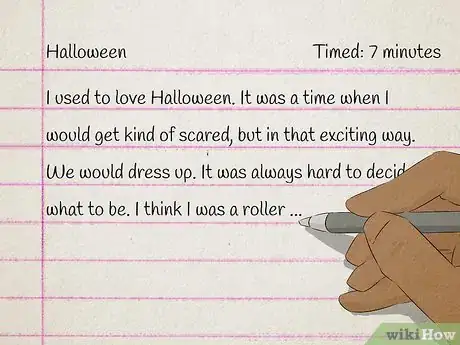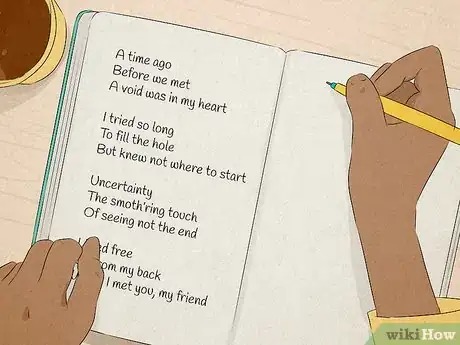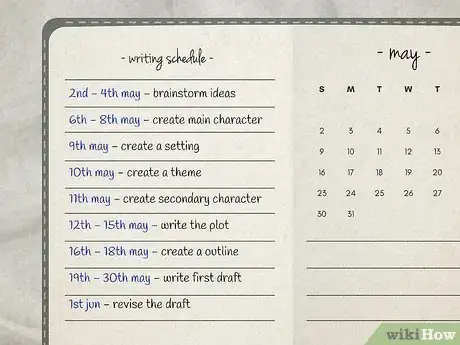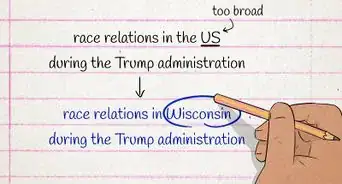This article was co-authored by Grant Faulkner, MA. Grant Faulkner is the Executive Director of National Novel Writing Month (NaNoWriMo) and the co-founder of 100 Word Story, a literary magazine. Grant has published two books on writing and has been published in The New York Times and Writer’s Digest. He co-hosts Write-minded, a weekly podcast on writing and publishing, and has a M.A. in Creative Writing from San Francisco State University.
This article has been viewed 28,965 times.
Maybe you have written a few pieces but feel you still need to grow as a writer. Or perhaps you are a seasoned writer who feels uninspired and is in need of a shake-up. Growing as a writer will help you to challenge yourself and force you to broaden your literary horizons. You can push yourself to grow as a writer by expanding your literary knowledge and playing with your writing style. You should also work on increasing your writing pace and get more involved in the writing community so you feel supported and challenged by others.
Steps
Expanding Your Literary Knowledge
-
1Expand your vocabulary. You can grow as a writer by taking the time to expand your vocabulary and learn new words. Try to learn one new word a day and use it somewhere in your writing, whether it’s in a poem, a short story, or a novel chapter. Adding one new word to your vocabulary each day can help you strengthen and deepen your writing. It also allows you to use words that may be unique or surprising to your reader. [1]
- You will need to get a good dictionary and a good thesaurus to expand your vocabulary. You may look up one new word a day and use it in a sentence. Or you may look up words that you notice in published writing so you can add it to your mental vocabulary bank.
-
2Read more. Great writers are often avid readers. Reading the works of others can help you improve your writing skills and determine what makes a “great work of literature” so great. Try to read a book a week or a week every other week, as your schedule allows. [2]
- You should read a variety of genres and styles so you have a better understanding of the stand-out works in each genre. Reading different genres and styles can also help you broaden your own writing style. You may decide to include elements of science-fiction after reading a sci-fi novel in your work. Or you may find yourself inspired to create a character based on a non-fiction character in a book.
- Reading a lot of books will also help you get a sense of what is being published and by which publishing houses. This may be beneficial if you plan to submit your writing for publication one day, as you want to be knowledgeable about what is currently on the market and which books are popular with readers.
Advertisement -
3Look at literary criticism. You should also take the time to read literary criticism in print magazines and publications as well as online. Reading literary criticism can expand your vocabulary and give you a sense of what critics are talking about in the writing world.[3]
- Literary criticism can come in the form of book reviews, opinion pieces of published works, or even blog posts by respected book critics. You may subscribe to magazines that print book reviews and literary opinion pieces or look at websites online that have a “Books” section.
Playing with Your Writing Style
-
1Find a new writing setting. You can shake up your writing habits and your writing style by choosing a new setting for writing. If you tend to go to the same coffee shop on the corner, head to a nearby park bench instead. Or, if you often write in your office at home you may try writing in a local bar to place yourself in a new environment. Sometimes, changing your writing setting can help to shift your writing so it feels new or different. [4]
- You may also want to consider writing with a partner if you have become tired of writing by yourself. You may ask a writer friend to sit with you in a cafe so you can write on your separate laptops. Or you may write with a friend and ask them for feedback on your writing as you go to change up your normal writing habits.
-
2Try different writing prompts. You can expand your literary horizons by focusing on experimentation. One way to do this is to try different writing prompts, which will force you to experiment and take a unique approach to your writing. Avoid writing prompts that you tend to use often or that feel familiar to you. Instead, push yourself to try writing prompts that might be strange or challenge for you. [5]
- If you tend to use the same writing prompt, pick a different writing prompt for your next freewrite or create your own prompt. Go for a prompt that you find disturbing or unsettling and push yourself to try it.
-
3Take on a new writing form. Let go of your usual writing style and take on a new writing form instead. You may challenge yourself to write in a genre or form that you find intimidating or difficult to do, or you may opt for a form that you have always wanted to try. [6]
- For example, if you tend to write contemporary fiction, you may try writing science fiction or if you often write non-fiction, you may try your hand at historical fiction. Mixing up your genres can help you grow as a writer and experiment with your style.
- You may try a new form to get you out of your comfort zone, such as trying your hand at poetry if you often write fiction. Or you may try writing a specific type of poetry, such as rhyming poems, if you usually write free verse poetry.
EXPERT TIPGrant Faulkner is the Executive Director of National Novel Writing Month (NaNoWriMo) and the co-founder of 100 Word Story, a literary magazine. Grant has published two books on writing and has been published in The New York Times and Writer’s Digest. He co-hosts Write-minded, a weekly podcast on writing and publishing, and has a M.A. in Creative Writing from San Francisco State University.Professional Writer
 Grant Faulkner, MA
Grant Faulkner, MA
Professional WriterTry journaling to gain experience with free writing. When you're writing in your journal, you can write without an intended goal. It doesn't matter if it's phrased perfectly. You're just expressing yourself, and you don't have to worry about anyone else reading it—even yourself. You're writing for the pure joy and meaning of it, and that's what free writing is.
-
4Improve one element of your writing. You may have one element of your writing that you often struggle with or find challenging to do well. Hone in on this element and work hard on it for a specific period of time. Work on improving this element so you feel confident and proficient at doing it well. [7]
- For example, you may struggle with writing dialogue well in your short stories. You may then set aside time everyday to improve your approach to dialogue. You may read published short stories that are dialogue heavy and work well on the page. You may also do exercises where you write a story only using dialogue or focus on improving dialogue in an existing draft of a story.
Increasing Your Writing Pace
-
1Dedicate time in your day to writing. To grow as a writer, you will need to spend a lot of time sitting in a chair, writing. It seems simple but it is one of the most important things you can do to grow as a writer. Try to dedicate a set period of time each day or several times a week to writing. You may focus on specific stories or ideas during your writing time or use this time to do freewrites and experiment with your style. Whatever you decide to do, make sure it connects back to writing somehow. [8]
- If you are currently writing something, you may set a certain page count or word count that you need to hit each time you sit down to write. You may then challenge yourself to reach this goal as a way to grow as a writer.
-
2Create a writing schedule. It may also help to create a set writing schedule with milestones and goals. Make the schedule clear and easy to follow. Then, commit to doing it so you can grow and get better as a writer.
- You may create the writing schedule by hand or by using a spreadsheet in Excel. You should include a word count or page count in your writing schedule as well as dates of when you are going to complete the story or novel.
- You should also note when you have hit a certain milestone or goal on your schedule. This can give you a sense of accomplishment and push you to stick to your schedule.
-
3Participate in a writing challenge. You can improve your writing pace by signing up for a local or national writing challenge. This could be a writing contest where you write a set number of pages or words within a period of time, such as a 30 day writing challenge. Doing a writing challenge can push you to write more often and complete a piece of writing within a set period of time. [9]
- You may also create your own writing challenge, where you give yourself a deadline for a certain piece of writing. You may then submit the finished draft to a writing contest or a call for submissions by a publication.
Getting More Involved in the Writing Community
-
1Take a writing class. You can improve your writing and get more involved in the writing community by taking a writing class in your area. You may sign up for a class at your local community center or through your local university. Attending a writing class will allow you to meet other writers and improve your craft.[10]
- You may choose a writing class that focuses on a writing element that you would like to improve on. For example, if you struggle with story structure, you may take a class on story structure and plot.
-
2Join a writing workshop group. You can also get involved by joining a writing workshop group in your area. Workshopping your writing with others can push you to get better and learn how to take constructive feedback. It will also allow you to meet other writers in your area and connect with them. [11]
- You may also consider joining an online writing workshop group, especially if there are not many writing groups available in your area. Regardless of whether you do an in person workshop or an online workshop, you will need to feel comfortable with sharing your working drafts with others and be able to handle getting feedback.
-
3Participate in live readings. Another good way to get involved in your writing community is to sign up for live readings at local venues in your area. You may notice a standing open mic night at your local bar and sign up as a reader or apply to be part of a reading at your local university. [12]
- Take advantage of any opportunities to read your work, as it will help you improve as a writer and allow you to get more comfortable with sharing your work with an audience.
References
- ↑ http://www.aliventures.com/21-ways-to-grow-as-a-writer/
- ↑ http://learn.org/articles/10_Ways_to_Become_a_Better_Writer.html
- ↑ http://www.eadeverell.com/grow/
- ↑ http://www.aliventures.com/21-ways-to-grow-as-a-writer/
- ↑ http://www.aliventures.com/21-ways-to-grow-as-a-writer/
- ↑ http://www.aliventures.com/21-ways-to-grow-as-a-writer/
- ↑ http://www.aliventures.com/21-ways-to-grow-as-a-writer/
- ↑ http://learn.org/articles/10_Ways_to_Become_a_Better_Writer.html
- ↑ http://darlingmagazine.org/4-ways-to-grow-as-a-writer/


















-Writing-Step-16.webp)











































